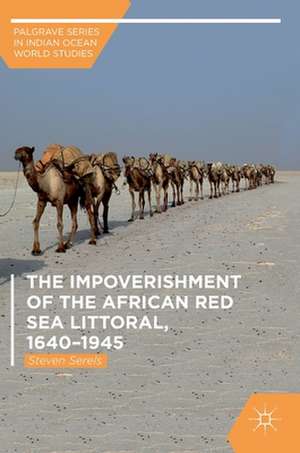The Impoverishment of the African Red Sea Littoral, 1640–1945: Palgrave Series in Indian Ocean World Studies
Autor Steven Serelsen Limba Engleză Hardback – 3 sep 2018
| Toate formatele și edițiile | Preț | Express |
|---|---|---|
| Paperback (1) | 578.55 lei 43-57 zile | |
| Springer International Publishing – 29 dec 2018 | 578.55 lei 43-57 zile | |
| Hardback (1) | 583.93 lei 43-57 zile | |
| Springer International Publishing – 3 sep 2018 | 583.93 lei 43-57 zile |
Din seria Palgrave Series in Indian Ocean World Studies
- 20%
 Preț: 629.92 lei
Preț: 629.92 lei - 18%
 Preț: 785.11 lei
Preț: 785.11 lei - 18%
 Preț: 787.91 lei
Preț: 787.91 lei - 18%
 Preț: 797.24 lei
Preț: 797.24 lei - 18%
 Preț: 1016.49 lei
Preț: 1016.49 lei - 18%
 Preț: 730.97 lei
Preț: 730.97 lei - 15%
 Preț: 643.99 lei
Preț: 643.99 lei - 18%
 Preț: 730.65 lei
Preț: 730.65 lei - 18%
 Preț: 894.79 lei
Preț: 894.79 lei - 18%
 Preț: 898.26 lei
Preț: 898.26 lei - 18%
 Preț: 795.68 lei
Preț: 795.68 lei - 9%
 Preț: 735.47 lei
Preț: 735.47 lei - 18%
 Preț: 780.19 lei
Preț: 780.19 lei - 18%
 Preț: 889.92 lei
Preț: 889.92 lei - 18%
 Preț: 786.04 lei
Preț: 786.04 lei - 9%
 Preț: 811.70 lei
Preț: 811.70 lei - 18%
 Preț: 729.06 lei
Preț: 729.06 lei -
 Preț: 390.63 lei
Preț: 390.63 lei - 15%
 Preț: 581.98 lei
Preț: 581.98 lei - 18%
 Preț: 730.16 lei
Preț: 730.16 lei -
 Preț: 384.86 lei
Preț: 384.86 lei - 15%
 Preț: 640.88 lei
Preț: 640.88 lei - 18%
 Preț: 780.06 lei
Preț: 780.06 lei - 18%
 Preț: 782.42 lei
Preț: 782.42 lei
Preț: 583.93 lei
Preț vechi: 686.97 lei
-15% Nou
Puncte Express: 876
Preț estimativ în valută:
111.74€ • 116.96$ • 92.100£
111.74€ • 116.96$ • 92.100£
Carte tipărită la comandă
Livrare economică 31 martie-14 aprilie
Preluare comenzi: 021 569.72.76
Specificații
ISBN-13: 9783319941646
ISBN-10: 331994164X
Pagini: 206
Ilustrații: XV, 204 p. 3 illus.
Dimensiuni: 148 x 210 mm
Greutate: 0.42 kg
Ediția:1st ed. 2018
Editura: Springer International Publishing
Colecția Palgrave Macmillan
Seria Palgrave Series in Indian Ocean World Studies
Locul publicării:Cham, Switzerland
ISBN-10: 331994164X
Pagini: 206
Ilustrații: XV, 204 p. 3 illus.
Dimensiuni: 148 x 210 mm
Greutate: 0.42 kg
Ediția:1st ed. 2018
Editura: Springer International Publishing
Colecția Palgrave Macmillan
Seria Palgrave Series in Indian Ocean World Studies
Locul publicării:Cham, Switzerland
Cuprins
1. Introduction: Becoming Poor.- 2. Survival by Conversion, 1640–1840.- 3. Divided and Conquered, 1840–1883.- 4. War, Disease, Famine, Destruction, 1883–1893.- 5. An Unequal Recovery, 1893–1913.- 6. The Cost of Living Becomes Unaffordable, 1913–1945.- 7. Conclusion: Being Poor.
Notă biografică
Steven Serels holds a joint appointment as Research Fellow at the Zentrum für Interdisziplinäre Regionalstudien at Martin Luther Universität Halle-Wittenberg, Germany, and as Visiting Scholar at Harvard University’s Center for Middle Eastern Studies, USA. His first monograph is titled Starvation and the State: Famine, Slavery, and Power in Sudan, 1883–1956 (Palgrave Macmillan, 2013).
Textul de pe ultima copertă
The African Red Sea Littoral, currently divided between Sudan, Eritrea, Ethiopia, and Djibouti, is one of the poorest regions in the world. But the pastoralist communities indigenous to this region were not always poor—historically, they had access to a variety of resources that allowed them to prosper in the harsh, arid environment. This access was mediated by a robust moral economy of pastoralism that acted as a social safety net. Steven Serels charts the erosion of this moral economy, a slow-moving process that began during the Little Ice Age mega-drought of the seventeenth and eighteenth centuries and continued through the devastating famines of the twentieth century. By examining mass sedentarization after the Second World War as merely the latest manifestation of an inter-generational environmental and economic crisis, this book offers an innovative lens for understanding poverty in northeastern Africa.
Caracteristici
Recovers the pre-colonial history of pastoralism in the African Red Sea Littoral, tracing links between this history and present-day poverty in the region Offers a novel regional approach to the study of pastoralist history, focusing on a set of communities with shared patterns of human-environment interaction Examines the factors which led to the decline of pastoralism in northeastern Africa, including environmental disaster, the decline of social relations, colonial rule, and changing global economic conditions
